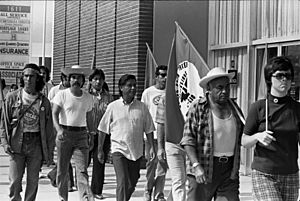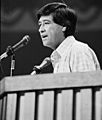César Chávez facts for kids
Quick facts for kids
César Chávez
|
|
|---|---|
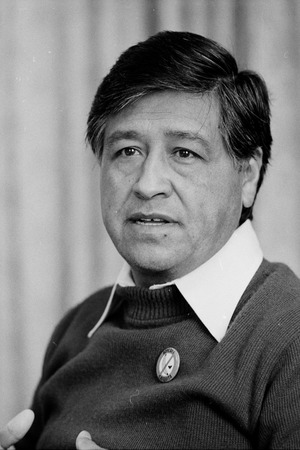
Chávez in 1979
|
|
| Born |
Cesario Estrada Chávez
March 31, 1927 Yuma, Arizona, U.S.
|
| Died | April 23, 1993 (aged 66) San Luis, Arizona, U.S.
|
| Resting place | César E. Chávez National Monument |
| Occupation | |
| Spouse(s) | Helen Fabela Chávez |
| Children | 8 |
| Awards |
|
César Chávez (born Cesario Estrada Chávez on March 31, 1927 – April 23, 1993) was an American labor leader and civil rights activist. He worked hard to improve the lives of farm workers. With Dolores Huerta, he started the National Farm Workers Association (NFWA). This group later joined with another to become the United Farm Workers (UFW) labor union.
Contents
Early Life of César Chávez
Cesario Estrada Chávez was born in Yuma, Arizona on March 31, 1927. He grew up in a Roman Catholic family. He had two sisters, Rita and Vicki, and two brothers, Richard and Librado.
When César was young, his family joined many others who moved to California during the Great Depression. They traveled often to find farm work. The working conditions were very tough, and the pay was low. Everyone in the family had to work hard. To have fun, César played handball and listened to boxing matches on the radio.
At his first school in Arizona, students were not allowed to speak Spanish. He was also asked to change his name to César. In California, he went to many different schools. He spent the longest time at Miguel Hidalgo Junior School. He was an average student but was very good at math. After finishing junior high in June 1942, he became a full-time farm worker.
Chávez joined the U.S. Navy in 1944. He left the Navy with an honorable discharge in 1946. After that, he returned home to California and continued working on farms.
Chávez's Activism for Workers
While in California, Chávez became involved with the Community Service Organization (CSO). He helped farm workers register to vote. This was important because it gave them a voice.
In 1959, he became the national director of the CSO. In 1962, he left the CSO to start the NFWA with Dolores Huerta. Their office was in Delano, California. He created an insurance plan, a credit union, and a newspaper called El Malcriado for farm workers. He also began organizing strikes to help workers get better pay and conditions.
The Delano Grape Strike
In September 1965, Filipino American farm workers started the Delano grape strike. They were organized by the Agricultural Workers Organizing Committee (AWOC) and wanted higher wages. Chávez and his mostly Mexican-American supporters decided to join them. The strike covered a huge area. It included picketing (protesting outside farms) and a long 340-mile march to Sacramento.
During the grape strike, Chávez's NFWA joined with Larry Itliong's AWOC. They formed the United Farm Workers (UFW) labor union in 1967. Chávez used peaceful methods, like boycotts and marches, to pressure farm owners. He wanted them to agree to the workers' demands.
On July 29, 1970, the grape growers in Delano signed contracts with the union. These contracts gave workers higher wages. They also included a health plan and new safety rules for using pesticides on crops. This was a big victory for the farm workers.
Later Years and Passing
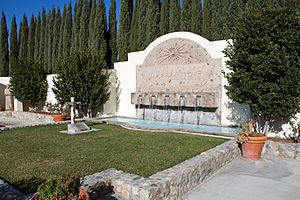
For the next decades, César continued to build the union. He kept fighting for the rights of farm workers. He strongly believed that boycotts and marches were the best ways to bring about change.
Chávez's mother passed away in December 1991. She was 99 years old. The next year, in September 1992, his mentor Ross also died. César Chávez died in his sleep on April 23, 1993, at the age of 66.
His body was flown to Bakersfield. His family said he died of natural causes. Many thousands of people came to visit his body. A funeral march took place in Delano. 120 pallbearers took turns carrying his coffin. Chávez was then buried in a private ceremony at La Paz.
Family Life
Chávez married Helen Fabela in 1948. They moved to San Jose, California. César and Helen had eight children: Fernando (born 1949), Sylvia (born 1950), Linda (born 1951), Eloise (born 1952), Anna (born 1953), Paul (born 1957), Elizabeth (born 1958), and Anthony (born 1958).
Helen preferred to stay out of the public eye, which César admired. While he led the union, she focused on raising their children, cooking, and taking care of their home.
Chávez's granddaughter, Julie Chávez Rodriguez, is also a political activist. She worked for the Obama administration from 2008 to 2016. In 2022, President Biden made her a senior advisor. In April 2023, it was announced that Rodriguez would manage Joe Biden 2024 presidential campaign. This was the first time a Latina was chosen to run the campaign of a sitting president.
Chávez's Personality
César Chávez was short and had dark black hair. He was usually quiet and a bit shy. Like many farm workers, he had severe back pain for much of his life.
He felt a little self-conscious that he only finished eighth grade. He wasn't a great public speaker and didn't like talking on the phone. However, he was very good at understanding people. He also preferred to do jobs himself rather than trusting others with them. He was good at making quick decisions.
César Chávez's Legacy
César Chávez is highly respected in California and other states. In 2000, California's state legislature created a holiday to honor him. The holiday is on March 31, which is Chávez's birthday. This was the first time a U.S. public holiday honored a Mexican American or a union leader.
Many cities have streets or places named after him. These include San Francisco, Los Angeles, Albuquerque, New Mexico, Austin, Texas, Chicago, Milwaukee, and Salt Lake City.
In 1998, he was added to the U.S. Department of Labor Hall of Honor by the United States Department of Labor.
Interesting Facts About César Chávez
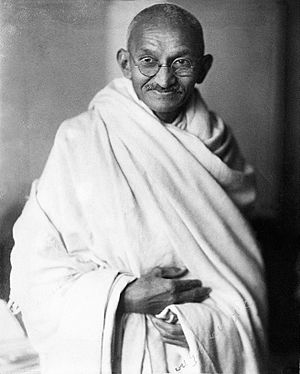
- Chávez was named after his grandfather, Cesario Chávez. He was a Mexican who came to Texas in 1898.
- As a child, Chávez was called "Manzi" because he liked manzanilla tea.
- He was a very devoted Catholic and rarely missed Mass.
- In 1970, he became a vegetarian.
- Chávez loved the music of Duke Ellington and big band music.
- He enjoyed dancing, even though he had ongoing back pain.
- He was also an amateur photographer and a keen gardener. He made his own compost and grew vegetables.
- For much of his adult life, Chávez kept German shepherd dogs for protection.
- He served in the United States Navy from 1944 to 1946. He was promoted to the rank of seaman first class.
- Chávez was greatly inspired by the ideas of Indian independence leader Mahatma Gandhi. He kept a large picture of Gandhi in his office. He also had pictures of Martin Luther King, and busts of John F. Kennedy and Abraham Lincoln.
- In 1994, he received the Presidential Medal of Freedom after his death. This is a very high honor.
- In 2014, President Barack Obama declared March 31 "César Chávez Day" in the United States.
- His slogan in 1972 was “Si, se puede,” which means “Yes, it can be done” in Spanish. This became a motto for Latino civil rights. It also inspired Barack Obama's “Yes we can” slogan for his 2008 presidential campaign.
Images for kids
-
Chávez's support for the Filipino government of Ferdinand Marcos (pictured) caused some criticism.
-
Chávez visiting Colegio César Chávez.
-
The César Chávez Memorial at San José State University by Judy Baca.
-
An illustration of labor leader César Chávez by Manuel Gregorio Acosta. It was on the cover of Time magazine in July 1969.
See also
 In Spanish: César Chávez para niños
In Spanish: César Chávez para niños
 | Bayard Rustin |
 | Jeannette Carter |
 | Jeremiah A. Brown |


